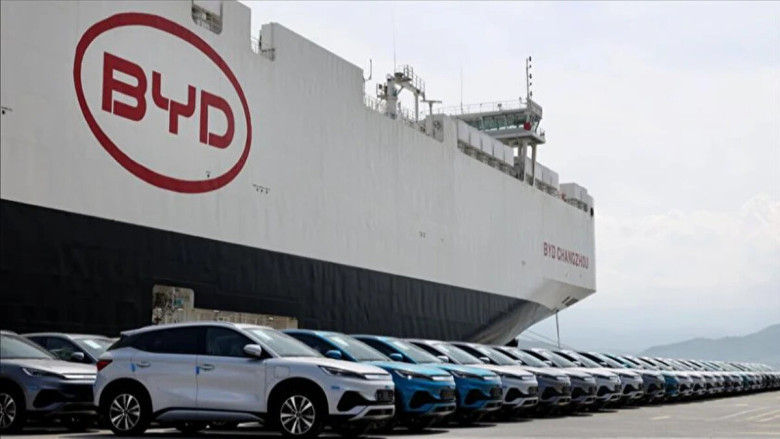BYD Overtakes Tesla: A Turning Point in the Electric Vehicle Landscape

In a remarkable shift within the electric vehicle (EV) industry, China's BYD has overtaken Tesla in electric car sales across Europe for the first time in history. This milestone, achieved in April 2023, marks a significant turning point not only for BYD but also for the entire European automotive market. As the automotive landscape continues to evolve, this moment offers a lens into the competitive dynamics shaping the industry's future.
BYD's Meteoric Rise
According to data from JATO Dynamics, BYD's sales surged by an astonishing 169 percent year-on-year, resulting in 7,231 fully electric cars sold in Europe. This growth trajectory represents a monumental success for BYD, which officially began its European operations beyond Norway and the Netherlands only at the end of 2022. In contrast, Tesla, once the undisputed leader in the European BEV (Battery Electric Vehicle) market, saw its sales plummet by 49 percent, totaling 7,099 units sold in the same month.
Felipe Munoz, a lead analyst at JATO Dynamics, commented on the gravity of BYD's achievement, stating, “Although the difference between BYD and Tesla's monthly sales data is small, its impact is huge.” This shift indicates a fracture in Tesla's longstanding dominance and suggests that a new player is swiftly redefining the competitive landscape of the electric vehicle market in Europe.
Plug-in Hybrids and the Broader Market
When plug-in hybrid vehicles (PHEVs) are included in the sales numbers, the gap between BYD and Tesla widens even further. BYD's total sales, accounting for both fully electric and plug-in hybrid vehicles, increased by a staggering 359 percent during this same period. This extraordinary growth not only showcases BYD's adaptability and extensive model range but also indicates a broader consumer shift towards hybrid and fully electric vehicles across Europe.
The broader market context cannot be ignored, as total electric vehicle registrations in Europe saw a robust increase of 28 percent in April. Even established players like Volkswagen reported a remarkable 61 percent increase in their electric car sales during the same period. This collective momentum indicates a growing consumer sentiment favoring electric mobility, as nations worldwide ramp up their efforts to transition to greener alternatives.
The Decline of Tesla
Tesla's recent challenges highlight a starkly changing narrative. Once revered for its innovation and leading-edge technology, the company's sales numbers are revealing a disturbing decline. Several factors contribute to this downturn, including supply chain disruptions, rising competition, and changing consumer preferences. However, it is perhaps the actions of CEO Elon Musk that have had profound implications for Tesla’s standing in Europe.
Elon Musk's controversial behavior—such as his notorious hand gesture at Donald Trump's inauguration and apparent open support for far-right political figures in Germany—has reportedly affected public perception of Tesla among European consumers. Musk's outspoken nature, while often seen as part of his brand identity, has increasingly led to a backlash, distancing potential buyers from the company.
The Emotional Landscape of Car Buying
To understand consumer behavior in the automotive sector, one must appreciate the emotional landscape that accompanies significant purchases like cars. Buyers don't just consider specifications and performance; brand VALUES play a crucial role. When consumers perceive a brand leader to be embroiled in political controversies or moral quandaries, they may choose to spend their money elsewhere—even if the alternative products are less established. This complex interplay of emotions and values can transform market dynamics in dramatic ways.
As Elon Musk's decisions resonate around the world, consumers in Europe are increasingly scrutinizing how these behaviors reflect their own values. This emotional disconnect could very well account for the slips in Tesla's sales, as more consumers turn to brands they feel align with their beliefs and principles.
A New Dawn for BYD
For BYD, the recent sales success marks not just a numerical victory but also a validation of its strategic vision. With aggressive investments in technology and a diversified range of offerings—from electric sedans to SUVs and buses—BYD has positioned itself as a formidable competitor, not only to Tesla but to all automakers in the quickly evolving EV market.
The company’s rapid expansion strategy has resonated well with European consumers, who appreciate the variety of models and price points available. The company's commitment to sustainability and innovation further cements its standing as a responsible choice in the eyes of eco-conscious buyers.
Looking Ahead: Implications for the EV Market
The ascension of BYD and the decline of Tesla signal shifting allegiances within the electric vehicle market of Europe. As more consumers flock to brands that resonate with their values and provide compelling options, the competitive landscape continues to change. This newfound competition could foster innovation as companies strive to keep up with evolving consumer expectations and industry standards.
Moreover, the impact of China in the global automotive market cannot be underestimated. With its vast resources, rapid technological advancements, and growing demand for electric vehicles, China is solidifying its place as a significant player in the automotive sector.
Conclusion
April 2023 marks a momentous occasion for BYD and signifies potential upheaval for established players like Tesla. As the automotive industry wrestles with evolving consumer sentiment, heightened competition, and emerging markets, the only constant is change. For suppliers, manufacturers, and consumers alike, the future of mobility looks electric—and profoundly interconnected to the values that drive human decisions. The journey toward sustainable transportation has just begun, and the landscape will undoubtedly continue to shift as we pave the road ahead.
The stories behind the numbers are what truly define this industry; the relationships between consumers and brands will dictate the winners in this changing game. Let us watch closely as the electric vehicle saga unfolds, with titans clashing and new challengers emerging, signaling a transformative era in transportation that promises to shape our future.














Comments
0 comment